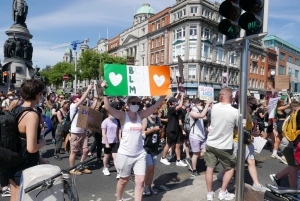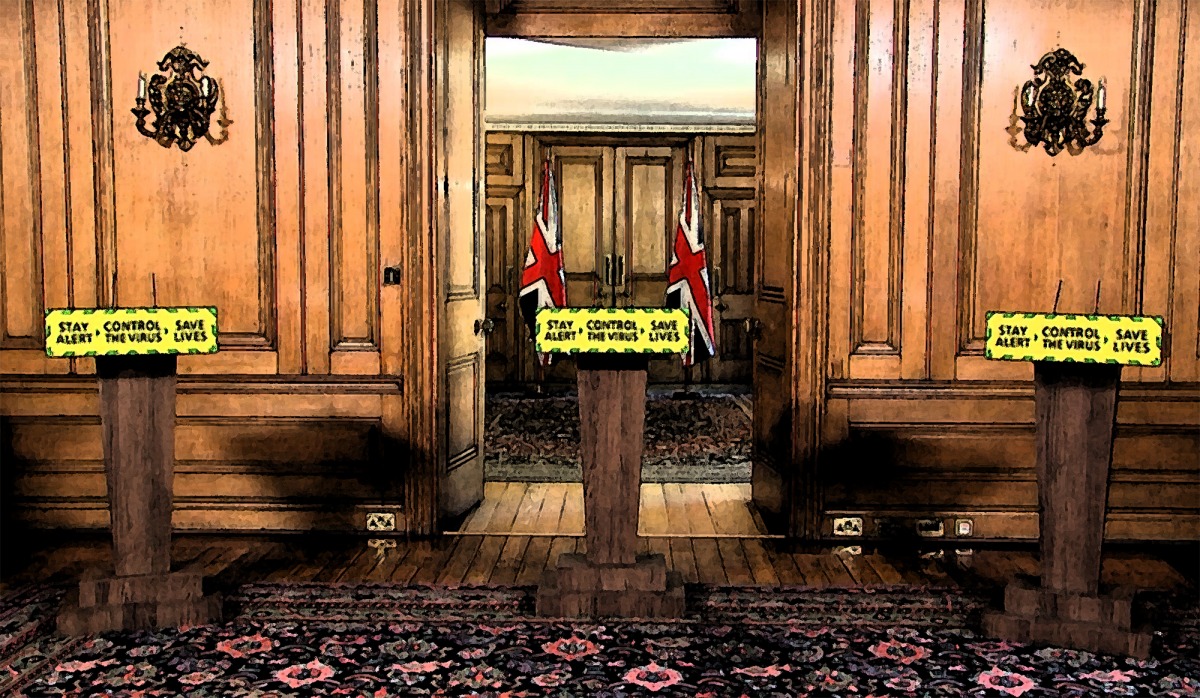The idea that our society might be moving in a fundamentally bad direction is an extremely difficult one to grapple with. We are aware that society is deeply flawed, sometimes even to the point of cynicism; and yet there is a certain basic soundness in the orientation of our society which we assume as a kind of bedrock.
Nevertheless, societies and whole cultures have gone bad in the past. We read about these slow, incremental drifts into authoritarianism and fascism in the history books of the twentieth century, always assuming with the benefit of hindsight that we would recognise the threat, and resist it if it ever emerged in our own time. In reality, however, to live through such a period must be quite different from reading about it in a history book. The sensation, I suspect, would be akin a child discovering some deep flaw in their parent. Our first impulse would be to repress the awareness, often until it is too late.
The idea that our response to the Covid-19 pandemic might be moving us in the direction of the authoritarian horrors of the last century is one that a great many are resistant to. They may feel, for example, that we are living with an extraordinary circumstance, and that the response, however undesirable and unprecedented, remains unavoidable in the face of the threat.
Even to those who feel this way, however, the danger of authoritarianism is something which we should all meditate very deeply on. The comparatively free societies which we have grown up in are a rare and precarious achievement; we are simply not aware how precarious because they are the only world we have ever known.
As the former Supreme Court justice and historian Lord Sumption pointed out in July: ‘Despotisms arise not because our liberty is forcibly taken away by tyrants but because people voluntarily surrender their liberty in return for protection from some perceived threat, and it is in the interests of governments to exaggerate that threat in order to procure compliance.’
Or, as the Italian philosopher Giorgio Agamben reminds us in August, ‘The state of emergency is the mechanism, history teaches us, by which democracies become totalitarian states.’
‘Parasite Stress’
The state of emergency is precisely when the free society is most imperilled, and pandemics are perhaps the most threatening to free democracy. The fear of contagion is deep-rooted in our genetics. It is for this reason that the language of infection and disease is so often the primary tool of demagogues and dictators.
The ‘Parasite Stress’ hypothesis holds that ‘authoritarian governments are more likely to emerge in regions characterised by a high prevalence of disease-carrying pathogens.’ Students of the psychology of politics have long noted a correlation between obsessive fear of contamination and the maintenance of rituals of cleanliness and order with the emergence of right-wing authoritarian tendencies. The theories of racial hygiene which underpinned the Nazi movement remain the most notorious and disturbing example of a regime utilizing the language of infectious threat to promote a totalitarian and racist ideology.
Others will reject concern about the increasingly authoritarian turn our societies have taken on the basis of an association with conspiracy theories. However, no conspiracy of any kind is really necessary for a society to slide into authoritarianism.
An awareness of psychology and history tells us that such a thing can happen entirely organically. Power is an innate appetite of human beings. It is such a strong drive that it can frequently seduce individuals without their conscious awareness. There is a reason why our liberal democracies are essentially predicated on the principle of providing checks and balances to curtail the powers of our ruling classes and bodies: unchecked power is dangerous.
This, again, is why the state of emergency is so perilous: it is the period where those checks and balances are willingly revoked by the population, and this is why the emergency is the best friend of the would-be dictator. What I think is particularly alarming about our current situation with Covid-19 is that we have now excepted the state of emergency – with all its suspension of democratic norms, civil liberties and curbs on state power – on an indefinite basis. Lets look briefly at how that happened.
Lockdown
The initial decision to lock down was perceived as momentous, and there was considerable discussion and soul-searching as to whether or not it was the correct course of action to take. The crucial moment, however, came later and passed largely unnoticed. The initial premise for locking down, it is vital to remember, was that it would be a short-term measure whose entire function was to prevent health services from being overwhelmed. Whether or not the decision was ultimately correct, it can at least be said that this first notion of lockdown was not entirely unreasonable on the face of it. It was an emergency measure which had a distinct goal and a set duration. The pivotal moment in all this was not when we agreed to lockdown, but rather when the underlying rationale for the lockdown was changed.
The happened in April, and in a quite peculiar way. There was no explicit announcement, no suggestion that such a significant matter should be a subject of national debate. Rather, there was a distinct change of language, a process whereby certain ideas were slipped into the conversation.
We would be ‘doing this until there is vaccine’ ministers suggested for the first time. On April 16th, for example, UK health minister Nadine Dorries testily announced on Twitter: ‘Journalists should stop asking about an ‘exit strategy.’ There is only one way we can ‘exit’ full lockdown and that is when we have a vaccine.’
Journalists should stop asking about an ‘exit strategy.’ There is only one way we can ‘exit’ full lockdown and that is when we have a vaccine. Until then, we need to find ways we can adapt society and strike a balance between the health of the nation and our economy . #COVID19
— Nadine Dorries 🇬🇧#StayAlert (@NadineDorries) April 15, 2020
This was also when we first began to hear the expression the ‘New Normal,’ repeated ad nauseam as a kind of spell to ward off critical reflection and debate. With virtually no debate or scrutiny from the media or political opposition, the rationale of the lockdown was changed from stopping the health service from being overwhelmed to suppressing the spread of the virus, putatively until a vaccine or some other innovation emerged.
The significance of this manoeuvre cannot be understated: it meant that the state of emergency, with all its dangerous suspension of democratic norms, has been extended, without oversight or opposition, indefinitely into the future. There needed to be a discussion in April about how sustainable and harmful such a process might be in the longer term, and how much sacrifice and suffering was effectively being gambled on the speculative efficacy of a vaccine which didn’t even exist at that point. Sadly, this conversation never really happened, owing to the decline of adversarial journalism and the torpor of political opposition.
For myself, I can remember being stunned and deeply shaken by this development. It felt as though freedoms which I had taken for granted all my life were suddenly, starkly cast away, perhaps forever. It seemed quite clear to me that the new model of suppression was entirely self-perpetuating: the more successful you are at suppressing the virus, the longer you will have to suppress it, because what you are also suppressing is natural immunity. We were committing ourselves to a endless cycle of deeply harmful measures and restrictions, supposedly on the basis that the eventual emergence of a vaccine would restore normalcy.
However, the efficacy of the vaccine was by no means guaranteed, and what was far more certain was that we would have done more harm to ourselves through the restrictions than the virus itself by that point. It was madness – the kind of self-destructive madness that emerges once a century or so, and completely unseats one’s faith in the power of human reason.
Fear and Mobilisiation
To return then to the theme of authoritarianism: how might the ongoing Covid-19 response be compared to an emergent system of authoritarian or even totalitarian control? In both instances, you will have a population whose attention is riveted to one subject to the exclusion of all others. The subject will always be an enemy or threat of some kind: the Communists, the Jews, or, in this particular instance, a virus.
Once the population is sufficiently afraid, the next step is mobilisation. By means of a joint government/media propaganda drive, the public is mobilized to a grand communal project, which can be the building of socialist paradise or Third Reich, a war effort, or indeed a unified national effort to slow the spread of a respiratory virus.
By this time, certain psychological effects become apparent in the populace: critical reflection is replaced by the repetition of command slogans (For King and Country! Stay Home, Stay Safe, Slow the Spread), and spontaneous acts of conscience are replaced by blind adherence to rules. As in the infamous Milgram Experiment, once a person concedes their autonomy to the State, their conscience goes with it, and the authoritarian regime is characterised by a slowly creeping banality of everyday evil.
The question remains, of course, are we really moving into authoritarianism, or are some of us simply imagining it? There was a peculiar period in late May and June when I thought my anxieties had been unfounded. Following the death of George Floyd, the media focused all its attention on racial justice and police brutality, and for a period of about two weeks, Covid-19 literally vanished from the public consciousness.

Black Lives Matter, Dublin, June 1st.
At that point, it looked as though things were getting back to normal: the epidemic had peaked, deaths and hospitalisations were beginning to flatline, and here in Ireland we had a roadmap back to normalcy with actual set dates. Since that brief oasis, however, things have taken a turn which has far exceeded my worst fears in April.
In hindsight, the mandating of masks seems to have been a pivotal turning point: just as the public were induced to cover their faces, the mask of a voluntary partnership with our governments began to slip away. Indeed, the whole communal, consent-based spirit of the initial lockdown was soon abandoned: increasingly bizarre, absurd and self-contradictory edicts emerged on a daily basis, and new police powers to enforce them. And we began to see disturbing scenes emerging in Australia, and increasingly, in our own countries.
Tensions have boiled over at an anti-lockdown rally at Parliament House in Melbourne. Dozens arrested. Capsicum spray used. Protesters chanted “human rights matter” and “freedom” before police moved in to remove them one by one. pic.twitter.com/CZEZkc5lt6
— Jack Paynter (@jackpayn) November 3, 2020
A Kind of Trance
What would it be like then, to live through the emergence of authoritarianism? I think that it would be exactly like the last nine months. The drift into authoritarianism is a kind of trance whereby things which would once have appeared appalling and impossible slowly insinuate themselves into our lives and societies. We now find them acceptable because we have been brought to the acceptance of a new reality. We have been made so hyper-conscious of one harmful thing (Covid-19) that all other harms begin to recede in significance, and all things become justifiable to a monomaniacal individual or society. The characteristic moment of authoritarian creep is that where the unthinkable becomes the everyday.
There have been so many instances of the unthinkable in the last nine months – moments that feel like stark warnings, like episodes from a historical slide down the path of authoritarianism – that a whole other essay might be taken up with them.
For example, in Australia in April the police interrupted a funeral as the coffin was being carried out to do a head count; in September they handcuffed a pregnant woman and took her from her home because of a Facebook post.
In the UK on the 26th of September, German doctor Heiko Schöning (a member of the German Corona Extra-Parliamentary Inquiry Committee) spoke to citizen journalist Anna Brees before he was due to address the Trafalgar Square Freedom Rally. Schöning told Brees that Germany was the epicentre of the anti-lockdown movement because of its historical awareness of authoritarianism. A couple of hours later, Schöning was surrounded by police, handcuffed and bundled into a van, and then detained for 22 hours for no other discernible reason than intimidation.
More recently at a protest in Berlin, human rights lawyer Markus Haintz and his girlfriend were brutally set-upon and arrested by police, again for no immediately discernible reason.
It is difficult to say which is more unsettling: that these things are happening in our societies, or that virtually nobody is talking about it. That, however, is probably how the authoritarian society always takes root: the conviction that it couldn’t be happening is so strong that people refuse to acknowledge the explicit evidence unfolding before their eyes that it is.
In our familiar conception of the deeply flawed society, we can easily demarcate ourselves from the villains, and many others will applaud us for criticizing them. The emergent authoritarian society, however, requires that we are all complicit; and eventually, mutual silence and complicity leads to a point of no return.
Again, however one feels about the proportionality of the Covid response, we must begin to take seriously the perilous path our societies have gone down.
I can’t shake the conviction that 2020 has been a kind of vast Milgram experiment, and of the European countries, Sweden alone has emerged with its democracy and humanity fully intact. The rest of us have unfettered the powers of the State to engage what has been arguably an assault on everything that is precious and meaningful in life: intimate contact, freedom, work, risk, childhood, youth and the future.
We are sleep-walking into what will be the greatest economic depression most of us will ever experience in our lifetimes; and doing so while while granting unchecked powers to our governments that likely would have horrified us only a few short months ago. What degrees of the unthinkable will have become part of our everyday existence in nine months time, if we continue along this course?




